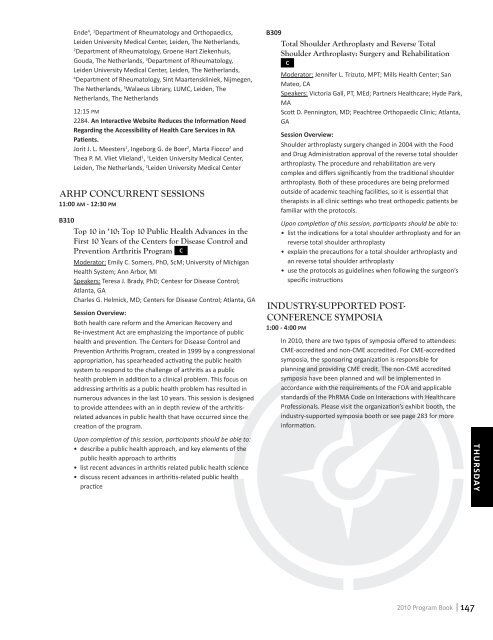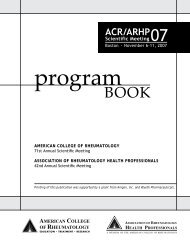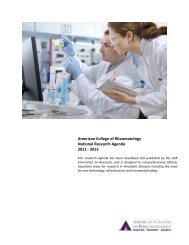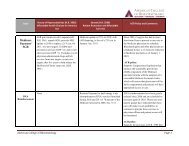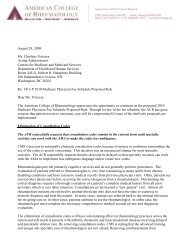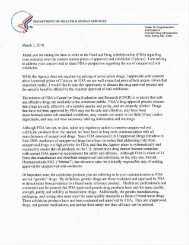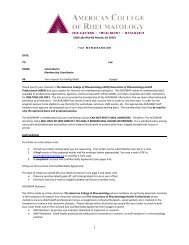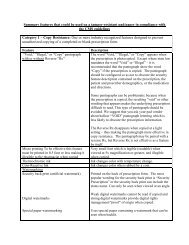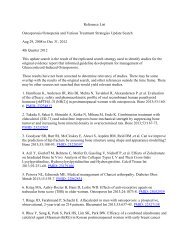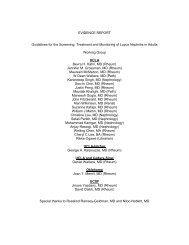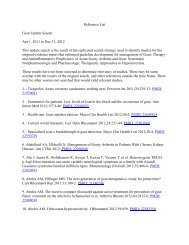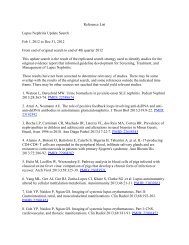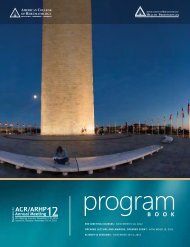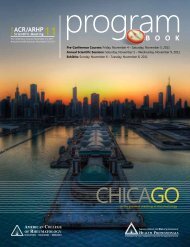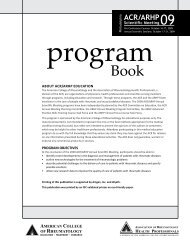B O O K - American College of Rheumatology
B O O K - American College of Rheumatology
B O O K - American College of Rheumatology
Create successful ePaper yourself
Turn your PDF publications into a flip-book with our unique Google optimized e-Paper software.
Ende 4 , 1 Department <strong>of</strong> <strong>Rheumatology</strong> and Orthopaedics,<br />
Leiden University Medical Center, Leiden, The Netherlands,<br />
2<br />
Department <strong>of</strong> <strong>Rheumatology</strong>, Groene Hart Ziekenhuis,<br />
Gouda, The Netherlands, 3 Department <strong>of</strong> <strong>Rheumatology</strong>,<br />
Leiden University Medical Center, Leiden, The Netherlands,<br />
4<br />
Department <strong>of</strong> <strong>Rheumatology</strong>, Sint Maartenskliniek, Nijmegen,<br />
The Netherlands, 5 Walaeus Library, LUMC, Leiden, The<br />
Netherlands, The Netherlands<br />
12:15 PM<br />
2284. An Interactive Website Reduces the Information Need<br />
Regarding the Accessibility <strong>of</strong> Health Care Services in RA<br />
Patients.<br />
Jorit J. L. Meesters 1 , Ingeborg G. de Boer 2 , Marta Fiocco 2 and<br />
Thea P. M. Vliet Vlieland 1 , 1 Leiden University Medical Center,<br />
Leiden, The Netherlands, 2 Leiden University Medical Center<br />
ARHP Concurrent Sessions<br />
11:00 AM - 12:30 PM<br />
B310<br />
Top 10 in ‘10: Top 10 Public Health Advances in the<br />
First 10 Years <strong>of</strong> the Centers for Disease Control and<br />
Prevention Arthritis Program C<br />
Moderator: Emily C. Somers, PhD, ScM; University <strong>of</strong> Michigan<br />
Health System; Ann Arbor, MI<br />
Speakers: Teresa J. Brady, PhD; Centesr for Disease Control;<br />
Atlanta, GA<br />
Charles G. Helmick, MD; Centers for Disease Control; Atlanta, GA<br />
Session Overview:<br />
Both health care reform and the <strong>American</strong> Recovery and<br />
Re-investment Act are emphasizing the importance <strong>of</strong> public<br />
health and prevention. The Centers for Disease Control and<br />
Prevention Arthritis Program, created in 1999 by a congressional<br />
appropriation, has spearheaded activating the public health<br />
system to respond to the challenge <strong>of</strong> arthritis as a public<br />
health problem in addition to a clinical problem. This focus on<br />
addressing arthritis as a public health problem has resulted in<br />
numerous advances in the last 10 years. This session is designed<br />
to provide attendees with an in depth review <strong>of</strong> the arthritisrelated<br />
advances in public health that have occurred since the<br />
creation <strong>of</strong> the program.<br />
Upon completion <strong>of</strong> this session, participants should be able to:<br />
• describe a public health approach, and key elements <strong>of</strong> the<br />
public health approach to arthritis<br />
• list recent advances in arthritis related public health science<br />
• discuss recent advances in arthritis-related public health<br />
practice<br />
B309<br />
Total Shoulder Arthroplasty and Reverse Total<br />
Shoulder Arthroplasty: Surgery and Rehabilitation<br />
C<br />
Moderator: Jennifer L. Trizuto, MPT; Mills Health Center; San<br />
Mateo, CA<br />
Speakers: Victoria Gall, PT, MEd; Partners Healthcare; Hyde Park,<br />
MA<br />
Scott D. Pennington, MD; Peachtree Orthopaedic Clinic; Atlanta,<br />
GA<br />
Session Overview:<br />
Shoulder arthroplasty surgery changed in 2004 with the Food<br />
and Drug Administration approval <strong>of</strong> the reverse total shoulder<br />
arthroplasty. The procedure and rehabilitation are very<br />
complex and differs significantly from the traditional shoulder<br />
arthroplasty. Both <strong>of</strong> these procedures are being preformed<br />
outside <strong>of</strong> academic teaching facilities, so it is essential that<br />
therapists in all clinic settings who treat orthopedic patients be<br />
familiar with the protocols.<br />
Upon completion <strong>of</strong> this session, participants should be able to:<br />
• list the indications for a total shoulder arthroplasty and for an<br />
reverse total shoulder arthroplasty<br />
• explain the precautions for a total shoulder arthroplasty and<br />
an reverse total shoulder arthroplasty<br />
• use the protocols as guidelines when following the surgeon’s<br />
specific instructions<br />
Industry-Supported Post-<br />
Conference Symposia<br />
1:00 - 4:00 PM<br />
In 2010, there are two types <strong>of</strong> symposia <strong>of</strong>fered to attendees:<br />
CME-accredited and non-CME accredited. For CME-accredited<br />
symposia, the sponsoring organization is responsible for<br />
planning and providing CME credit. The non-CME accredited<br />
symposia have been planned and will be implemented in<br />
accordance with the requirements <strong>of</strong> the FDA and applicable<br />
standards <strong>of</strong> the PhRMA Code on Interactions with Healthcare<br />
Pr<strong>of</strong>essionals. Please visit the organization’s exhibit booth, the<br />
industry-supported symposia booth or see page 283 for more<br />
information.<br />
thursday<br />
2010 Program Book 147


